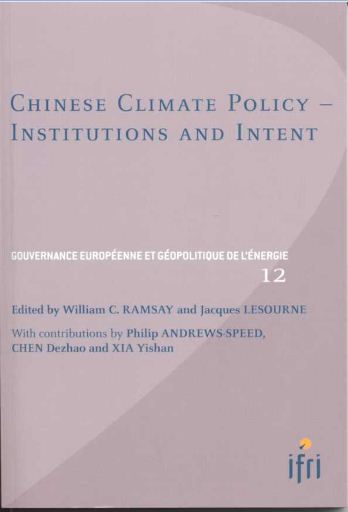Chinese Climate Policy: Institutions and Intent

Until the late 1990s, the balance of Chinese energy production and consumption was treated by the rest of the world as a net figure. No one knew what was going on inside the Chinese economy - it was a black box. As far as anyone was concerned, the Chinese would not soon be a major factor in world energy markets.
Energy policymakers realized how totally blind they were in 2004 when Chinese electricity production could not keep up with internal demand and the world experienced a surge in liquids demand as Chinese entrepreneurs fired up generator sets across the economy.
No country has confronted the need to collect data and formulate coherent policy for nearly a billion and a half consumers. A number of institutional arrangements have succeeded each other until now, when stronger energy policy and administrative functions of the National Development and Reform Commission (NDRC) are gaining traction. NDRC vice-chairman Zhang Guobao has maintained a steady hand on Chinese energy-policy evolution for several years - overseeing the increasing coherence of Chinese domestic and international energy policy - but the tension with powerful state enterprises and other vested interests still effectively defies efforts to truly centralize Chinese national-level energy policy and program authority.
This study identifies the nature of the forces that drive or constrain change within China’s energy sector, and explores the Chinese approach to climate change.

Available in:
Regions and themes
ISBN / ISSN
Share
Download the full analysis
This page contains only a summary of our work. If you would like to have access to all the information from our research on the subject, you can download the full version in PDF format.
Chinese Climate Policy: Institutions and Intent
Related centers and programs
Discover our other research centers and programsFind out more
Discover all our analyses
China’s Strategy Toward Pacific Island countries: Countering Taiwan and Western Influence
Over the past decade, China has deployed a diplomatic strategy toward the Pacific Island Countries (PICs). This strategy pursues two main objectives: countering Taiwan's diplomatic influence in the region and countering the influence of liberal democracies in what Beijing refers to as the "Global South."

Opening up the G7 to South Korea to Address Contemporary Global Challenges
The G7’s global influence has diminished as powers like China reshape international governance through initiatives such as BRICS and the Shanghai Cooperation Organisation (SCO). With the G7 now representing just 10 per cent of the world’s population and 28 per cent of global GDP, its relevance is increasingly questioned.
Expanding SPDMM as a pivotal institution in the Pacific – A French perspective
The South Pacific Defence Ministers’ Meeting (SPDMM) is the only forum that brings together defense ministers from the wider South Pacific — including Chile, which is hosting it for the first time. This heterogeneous group of countries with varying resources, capacities, and interests — Australia, Chile, Fiji, France, New Zealand, Papua New Guinea (PNG), and Tonga — are united by their shared determination to strengthen cooperation on maritime security and humanitarian assistance and disaster relief (HADR) activities.
EU’s Derisking From China: A Daunting Task
With economic security as a major concern, the EU has recently turned to “derisking” from China. The EU strategy entails reducing critical dependencies and vulnerabilities, including in EU supply chains, and diversifying where necessary, while recognizing the importance and need to maintain open channels of communication.










